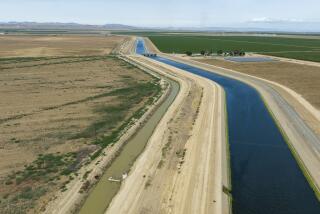Roundabout Fix to the Broken Delta
- Share via
SACRAMENTO — The delta smelt is a tiny, shy fish. But it may have a monstrous impact on the water supply for two out of three Californians.
Although only finger-size, the smelt has become a club for environmentalists to bludgeon water regulators--and the entire state--into making amends for a quarter-century of head-in-the-sand avoidance of severe fish depletion in the Sacramento-San Joaquin Delta.
For San Joaquin Valley farmers terrified of endangered-species acts, the smelt is a symbol of silliness. “It’s disturbing to take a little three-inch fish that most people never have seen, never even have heard of, and devote this kind of water to. It puts an awful lot of jobs at stake,” says Bob L. Vice, president of the California Farm Bureau Federation.
The environmentalists’ view is typified by Dale Sweetnam, project leader for the State Fish and Game Department’s delta smelt study: “This is not about just the delta smelt against the water users of California. It’s about all species in the estuary. And since they all are declining, something is wrong.”
As Gov. Pete Wilson observed a year ago in trying to chart a politically safe course between farmers, environmentalists and urban dwellers, “Any program must begin by recognizing a disturbing truth: The delta is broken.”
And the delta is California’s main plumbing fixture.
*
A broken delta is what all three competing interests in the state’s perpetual water wars finally are opening their eyes to.
The translucent smelt especially caught farmers’ eyes when the U.S. Fish and Wildlife Service last month declared it a threatened species. That action ultimately will result in reduced water deliveries for farms and cities.
Eyes also have been opened by a handful of other events in recent months, including:
* The enactment of landmark federal legislation diverting huge amounts of water from agriculture to the environment.
* The drafting by the State Water Resources Control Board of a plan to sharply reduce delta water exports. But agriculture is fighting ferociously, the governor is listening, his Administration is split between water and wildlife advocates, the plan is on hold and environmentalists are nervous.
* The shutdown of delta pumps for 12 days in February to protect endangered young winter-run salmon from being sucked into oblivion.
*
In truth, the delta smelt is not a compelling symbol for environmentalism. It certainly is not in a league with the bald eagle, whooping crane, winter-run salmon or charming (although unfortunately named) gnatcatcher.
“It’s actually a very pretty fish,” insists biologist Sweetnam. But he is one of the few people who would know. Certainly the grunion-looking critter is not all that photogenic.
The smelt also is not an important forage fish for larger game species, such as the popular striped bass. “What striped bass prefer to eat is their own young,” says Peter Moyle, a UC Davis fisheries professor and tenacious champion of the smelt.
People don’t eat delta smelt either.
So the smelt is undistinguished. But it is not insignificant, because what is good for the smelt is good for other troubled fish. And there are a lot in trouble. Striped bass have declined by 75% since the State Water Project began operating about 30 years ago. Winter-run salmon are down by more than 90%; spring-run by 80% and fall-run by 50%.
*
The problems are simple to see, even if the solutions politically are not.
More than half the water flowing into the delta is diverted south. But that in itself is not the major problem. The killer is the diversion system--the massive pumps that reverse river flows, disorienting young fish and either devouring them or exiling survivors to aqueducts and reservoirs where they cannot reproduce.
To protect fish, the pumps are being run at greatly reduced capacity at a time of flood threat, when 150,000 acre-feet of water per day tumble into San Francisco Bay and out the Golden Gate.
The solution increasingly being talked about--although in whispers and never using the P-word--is another proposed Peripheral Canal. This would transfer water by bypassing the delta and the pumps altogether. It would make sense for environmentalists--if they could be guaranteed sufficient delta water flows--because fish would be protected. Farmers and urban interests--if they could compromise with environmentalists--would be assured a steady water stream.
Voters, especially farmers and environmentalists distrustful of each other, overwhelmingly rejected this concept in 1982. But many in the Capitol are thinking it probably is the only way to fix the broken delta.
More to Read
Sign up for Essential California
The most important California stories and recommendations in your inbox every morning.
You may occasionally receive promotional content from the Los Angeles Times.














